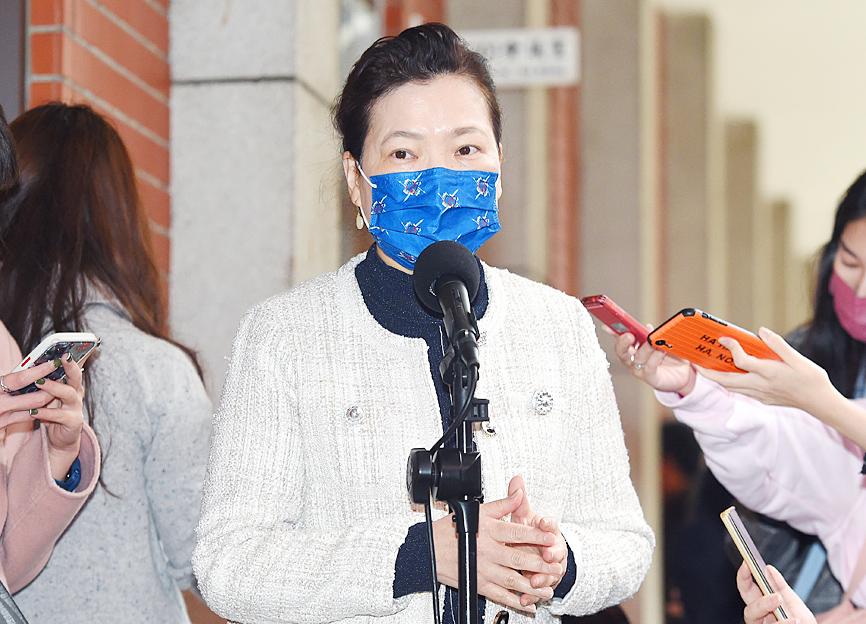A lockdown to contain a surging COVID-19 outbreak in Shanghai, where many Taiwanese companies have operations, could affect their shipments, Minister of Economic Affairs Wang Mei-hua (王美花) said yesterday.
Speaking with reporters on the sidelines of a meeting of the legislature’s Economics Committee, Wang said the Industrial Development Bureau had contacted Taiwanese firms in Shanghai to better understand the fallout from the lockdown.
Wang said that the companies’ operations had not been disrupted, but there are concerns that shipments could be affected.

Photo: Liao Cheng-hui, Taipei Times
Shanghai authorities on Sunday introduced a phased lockdown, with citywide testing to commence as the city reported a new high of about 3,500 infections on that day.
In the first phase, areas east of the Huangpu River began a lockdown and mass testing from yesterday until Friday. In the second phase, areas west of the river are to be under lockdown and undergo testing from Friday until Tuesday next week.
During the lockdowns, public transportation is suspended, with unapproved vehicles not being allowed on the roads, and non-essential businesses being closed. People are required to stay at home.
Materials Analysis Technology Inc (閎康科技), which runs a laboratory for a wide range of testing — such as material analysis, reliability analysis and failure analysis — said that deliveries from its Shanghai subsidiary would be postponed until the end of the phased lockdown.
To compensate for delays, the company is reallocating its global production while keeping in close contact with clients and suppliers regarding the lockdown.
The company has put essential measures in place to ensure its employees’ health and safety in Shanghai, it said.
Silicon wafer supplier Wafer Works Corp (合晶科技) said that it expects shipments to be affected by the lockdowns, although production remains normal at its Shanghai site.
Contract chipmaker Taiwan Semiconductor Manufacturing Co (TSMC, 台積電) said the lockdowns are unlikely to affect production at its fab in Shanghai, adding that the company plans to follow the city’s COVID-19 prevention guidelines.
TSMC runs an eight-inch wafer fab in Shanghai’s Songjiang District.
IC packaging and testing services provider ASE Technology Holding Co (日月光投控) said the restrictions on movement are expected to raise the logistics costs of subsidiary Universal Scientific Industrial (Shanghai) Co (USI, 環旭電子).
USI plans to spend more to take care of its employees in the city while abiding by rules imposed by Shanghai health authorities, ASE said, adding that it expects the measures to have limited effects on its sales.
USI operates several plants in the Zhangjiang Hi-Tech Park in Pudong to provide tailored systematic production solutions for smart wearable device suppliers.

Taiwan will prioritize the development of silicon photonics by taking advantage of its strength in the semiconductor industry to build another shield to protect the local economy, National Development Council (NDC) Minister Paul Liu (劉鏡清) said yesterday. Speaking at a meeting of the legislature’s Economics Committee, Liu said Taiwan already has the artificial intelligence (AI) industry as a shield, after the semiconductor industry, to safeguard the country, and is looking at new unique fields to build more economic shields. While Taiwan will further strengthen its existing shields, over the longer term, the country is determined to focus on such potential segments as

UNCERTAINTY: Innolux activated a stringent supply chain management mechanism, as it did during the COVID-19 pandemic, to ensure optimal inventory levels for customers Flat-panel display makers AUO Corp (友達) and Innolux Corp (群創) yesterday said that about 12 to 20 percent of their display business is at risk of potential US tariffs and that they would relocate production or shipment destinations to mitigate the levies’ effects. US tariffs would have a direct impact of US$200 million on AUO’s revenue, company chairman Paul Peng (彭雙浪) told reporters on the sidelines of the Touch Taiwan trade show in Taipei yesterday. That would make up about 12 percent of the company’s overall revenue. To cope with the tariff uncertainty, AUO plans to allocate its production to manufacturing facilities in

COLLABORATION: Given Taiwan’s key position in global supply chains, the US firm is discussing strategies with local partners and clients to deal with global uncertainties Advanced Micro Devices Inc (AMD) yesterday said it is meeting with local ecosystem partners, including Taiwan Semiconductor Manufacturing Co (TSMC, 台積電), to discuss strategies, including long-term manufacturing, to navigate uncertainties such as US tariffs, as Taiwan occupies an important position in global supply chains. AMD chief executive officer Lisa Su (蘇姿丰) told reporters that Taiwan is an important part of the chip designer’s ecosystem and she is discussing with partners and customers in Taiwan to forge strong collaborations on different areas during this critical period. AMD has just become the first artificial-intelligence (AI) server chip customer of TSMC to utilize its advanced

Chizuko Kimura has become the first female sushi chef in the world to win a Michelin star, fulfilling a promise she made to her dying husband to continue his legacy. The 54-year-old Japanese chef regained the Michelin star her late husband, Shunei Kimura, won three years ago for their Sushi Shunei restaurant in Paris. For Shunei Kimura, the star was a dream come true. However, the joy was short-lived. He died from cancer just three months later in June 2022. He was 65. The following year, the restaurant in the heart of Montmartre lost its star rating. Chizuko Kimura insisted that the new star is still down